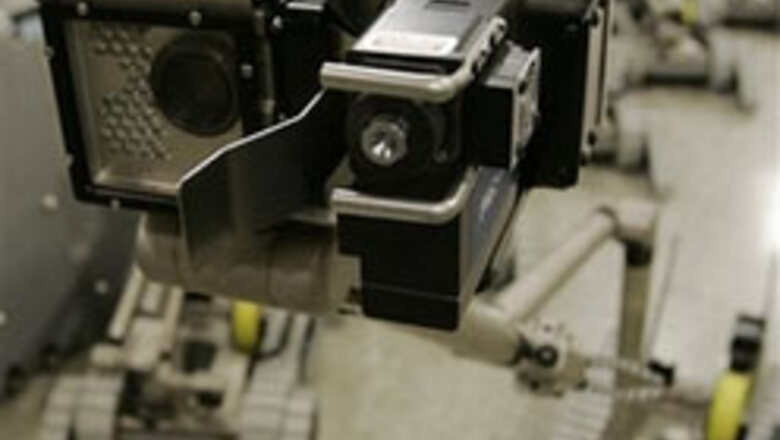
views
Dayton (Ohio): As it increases its use of robots in war zones, the military will begin using an explosive-sniffing version that will allow soldiers to better detect roadside bombs, which account for more than 70 per cent of US casualties in Iraq.
Fido is the first robot with an integrated explosives sensor. Burlington, Mass.-based iRobot Corp. is filling the military's first order of 100 in this southwest Ohio city and will ship the robots over the next few months.
There are nearly 5,000 robots in Iraq and Afghanistan, up from about 150 in 2004. Soldiers use them to search caves and buildings for insurgents, detect mines and ferret out roadside and car bombs.
As the war in Iraq enters its fifth year, the federal government is spending more money on military robots and the two major US robot makers have increased production.
Foster-Miller Inc., of Waltham, Mass., recently delivered 1,000 new robots to the military. IRobot cranked out 385 robots last year, up from 252 in 2005.
The government will spend about $1.7 billion on ground-based military robots between fiscal 2006 and 2012, said Bill Thomasmeyer, head of the National Center for Defense Robotics, a congressionally funded consortium of 160 companies, universities and government labs. That's up from $100 million in fiscal 2004.
Fido, produced at a GEM City Manufacturing and Engineering plant, represents an improvement in bomb-detecting military robots, said Col. Terry Griffin, project manager of the Army/Marine Corps Robotic Systems Joint Project Office at Redstone Arsenal, Ala.
The bomb-sniffing sensor is part of the robot, with its readings displayed on the controller along with camera images.
Otherwise, a soldier would have to approach the suspect object with a sensor or try to attach it to a robot.
PAGE_BREAK
The new robot has a seven-foot manipulator arm so it can use the sensor to scan the inside and undercarriage of vehicles for bombs.
Officials would not release details of how the sensors work because of security concerns.
"The sniffer robot is a very good idea because we need some way of understanding ambiguous situations like abandoned cars or suspicious trash piles without putting soldiers' lives on the line," said Loren Thompson, defense analyst with the Washington-based Lexington Institute.
Philip Coyle, senior adviser to the Center for Defense Information in Washington, said the robots could be helpful if they are used in cases where soldiers already suspect a bomb.
But he said explosive-sniffing sensors are susceptible to false positives triggered by explosive residues elsewhere in the area, smoke and other contaminants.
"The soldiers can begin to lose faith in them, and they become more trouble than they're worth," he said.
Thompson said all military robots have limitations. An operator must dictate every move pf theirs. Barriers or steep grades can stop them. They are not highly agile and they can break down or be damaged, he said.
Robots range in size from tiny — 1.5-pound ones carrying cameras are tossed into buildings to search for insurgents — to brute — 110-pound versions move rubble and lift debris.
Fido is an upgrade of PackBot, a 52-pound robot with rubber treads, lights, video cameras that zoom and swivel, obstacle-hurdling flippers and jointed manipulator arms with hand-like grippers designed to disable or destroy bombs. Each costs $165,000.
Army Staff Sgt. Shawn Baker, of Olean, New York, has helped detect and disable roadside bombs during two tours in Iraq.
Before the robots were available, he and fellow soldiers would stand back as far as possible with a rope and drag hooks over the suspect devices in hopes of disarming or detonating them.
Two soldiers were killed that way, Baker said. No one in his unit has been hurt or killed while disarming bombs since the robots arrived.
"The science and technology of this has been way out in front of the production side," Thomasmeyer said.
"We're going to start to see a payoff for all the science and technology advancements."
IRobot posted $189 million in sales last year, up 33 per cent from 2005. Its military business grew 60 per cent to about $76 million.
Bob Quinn, general manager of Foster-Miller, said his company has contracts of $320 million for military robots and that its business has doubled every year for the past four years.
















Comments
0 comment